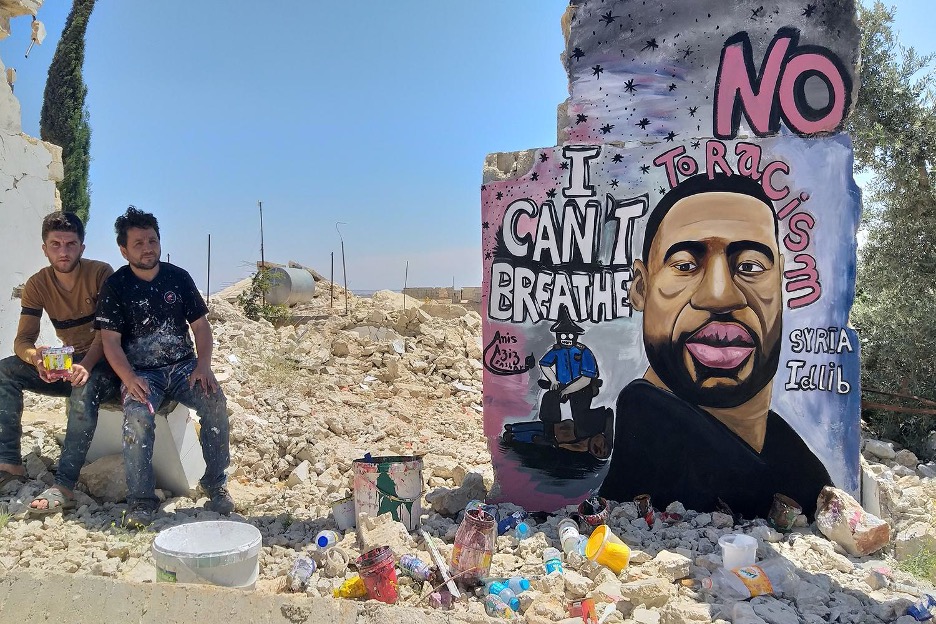Race in the Middle East and North Africa: From the Ottoman Empire to Black Lives Matter

Race is a lived experience and some individuals can’t function in society without being racialized and that is something that can be observed globally, including in the Middle East, according to a panel discussion titled held on Feb. 16.
The event titled “Race in the Middle East and North Africa: From the Ottoman Empire to Black Lives Matter” was part of the Dean’s global forum and featured Dean Marwan Kraidy in conversation with Eve Trout Powell, professor of history at the University of Pennsylvania and president-elect of the Middle East Studies Association.
During the first part of the panel, Powell recounted a personal experience in Cairo that got her interested in questions of race in the Middle East, a subject that she later extensively researched and wrote about. While in a cab with a Sudanese friend, she explained how the driver referred to her friend as ‘Abeed’ (meaning slave), which is synonymous to the n-word in English.
Powell explained that race was not an active topic discussed in academia when it came to studies of the Middle East. She talked about how the conversation about race in the Middle East was stigmatized and how oftentimes “people wouldn’t want to talk openly about it in public.”
“In the framework when I was writing my dissertation, really no one wanted to talk about race in Middle East studies,” she said.
Powell added that her observations as a history scholar opened her eyes and inspired her to start this conversation by deciding to write a dissertation and dig deeper into the phenomenon.
“Egypt had just lost control over Sudan in 1884 and it had just been occupied by the British, …just as a historian, the idea that there is nothing in here, and then there was this word ‘Abeed,’ it just didn’t make sense to me,” she explained.
The Arabic word ‘eunsuria,’ which means racism, was present in the Egyptian discourse and that led Powell to think that “if the vocabulary is there then there is a reason why it’s there,” she added.
While writing her book “Tell this in my memory,” Powell was told that she wouldn’t find narratives about slavery in Arabic-Turkish and Farsi. “That’s only in the United States,” her colleagues told her.
She later found out that this wasn’t the case at all. A good example of that would be the rich memoirs of Ibrahim Bey, who wrote about his life as a Mamluk in Egypt, after being captured and enslaved by the Ottomans, she explained.
In the second half of the panel, Powell and Kraidy discussed the entanglement of notions of slavery and power. As an example, Egyptian colonialism of Sudan and British colonialism were discussed. Kraidy asked Powell how both of these colonial enterprises were alike and how they differed.
“With every colonial enterprise, we have a racializing process that explains, justifies, naturalizes all kinds of social and political orders,” she said.
Powell highlighted how the understanding of colonialism may have affected the way Egypt’s colonization of Sudan is perceived.
“The idea that an Egyptian government could colonize Sudan didn’t make sense because colonialism was so framed in terms of European’s interventions in Egypt,” she added.
She also explained that the definition of colonialism was different at the time and didn’t have the pejorative connotation it holds today.
“Colonialism was not a bad word in the late 19th century. Colonialism was a sign that your government could govern you and could govern other people,” she highlighted.
In the second part of the panel, Powell discussed her latest work about media and digital culture in the Middle East. Kraidy asked Powell to offer insight into how the sense of representation of race in both the U.S. and the Middle East region differs in contemporary media.
“In the Middle East, especially in Egypt, there were and are two kinds of blackfaces, particularly in comedy. One is making fun of Sudanese people…. the other kind is making fun of rastas, of African Americans, Hip Hop stars,” she said.
Manifestations of blackfaces in Egyptian media “have no relationship with U.S. slavery” but “have more to do with the history of slavery within Egypt,” she explained. Oftentimes, the use of blackface sought to portray Sudanese people as “speaking in unintelligible ways,” “as dark as anyone could ever be,” and “oversexed.”
Talking about the example of a Lebanese celebrity who used the hashtag #blacklivesmatter to express solidarity with the movement while using blackface, Powell said, “What we are missing here is the history of what these images have meant…and the history of enslavement that is behind them.”
One attendee said that, as a Muslim, she was curious to know why Muslim people allow themselves to be racist even when their religion forbids them to do so.
“I would say that often religion cannot save us from racism for so many different reasons,” answered Powell.
She explained that in Sudan for instance, enslavement did not include Muslim communities, so only those who practiced non-monotheistic religions could be enslaved.
“So, I think the role of Islam is multi-faceted and huge and complicated,” she said.
Another attendee asked about the relationship between nationalism and racism. Powell explained that nationalism in itself is what induces racism. Because of its idealization of an ideal archetype, the question is “who becomes what someone else isn’t.”
“Within nationalism comes an authorization that can be very sad…the first victims of nationalism are almost always visible minorities,” she concluded.












